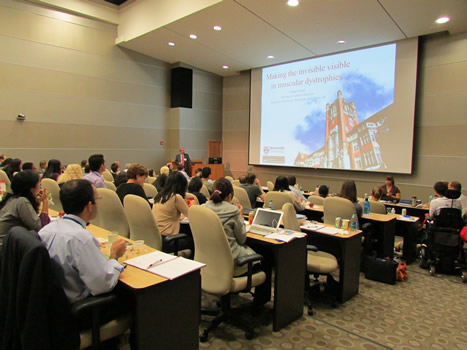
Starting in 2011, our Center began designing specialized courses that we feel will improve the collective training environment of our graduate students and postdoctoral fellows. Importantly, these courses are open to enrollment for all trainees within the university and are now accessible to external viewers through live-streamed and video podcast lectures. These courses were supported by a National Institutes of Health (NIH) T32 training grant for the training of neuromuscular diseases.
For our first class, we structured a course called, “Fundamentals of Neuromuscular Biology and Pathophysiology”. This team-taught course covered the fundamentals of neuromuscular disease, starting with pathology and electrophysiology, then proceeding to the mechanisms that underlie neuromuscular disorders, and ending with the development of therapeutic approaches to neuromuscular disorders. This course met weekly for 10 sessions.
In 2014, we offered an updated version of this course that provided a simplified context for the material. Rather than focus on all neuromuscular disorders, we examined the fundamental biology and pathology through the lens of a single disease. This allowed for an in-depth look at each foundational element to understanding, researching and ultimately treating the disorder. For the 2014 class, the disease we focused on was Duchenne Muscular Dystrophy, and in 2015 we examined Amyotrophic Lateral Sclerosis.
The syllabus for the class is designed so that introductory lectures are instructed by the clinical faculty in the muscle group who can provide the backdrop for neuromuscular diseases, with an emphasis on the selected disease for the course. Subsequent lectures are given by clinical and basic science faculty on the basic structure of skeletal muscle and the motor neuron, incorporating aspects of the neuromuscular junction. This then leads to lectures by other basic science faculty to discuss skeletal muscle development and muscle regeneration, the physiology of skeletal muscle and comparisons to heart, signaling pathways that regulate muscle homeostasis and turnover, and post translational glycosylation. Next, lectures are provided by faculty instructing on the development and use of animal models for the testing of mechanisms underlying neuromuscular diseases. Lectures conclude by coming full circle where clinical faculty will discuss the current state of treatment and clinical trials.
We hope you will take a look at the topics covered in this course and if interested even go over the videos and/or slides presented by each of our faculty during their lecture, which we have made available for all visitors to our website.
2015 - Amyotrophic Lateral Sclerosis (ALS)
2014 - Duchenne Muscular Dystrophy (DMD)
2012 - Neuromuscular Disorders Overview
Myology Course
|

